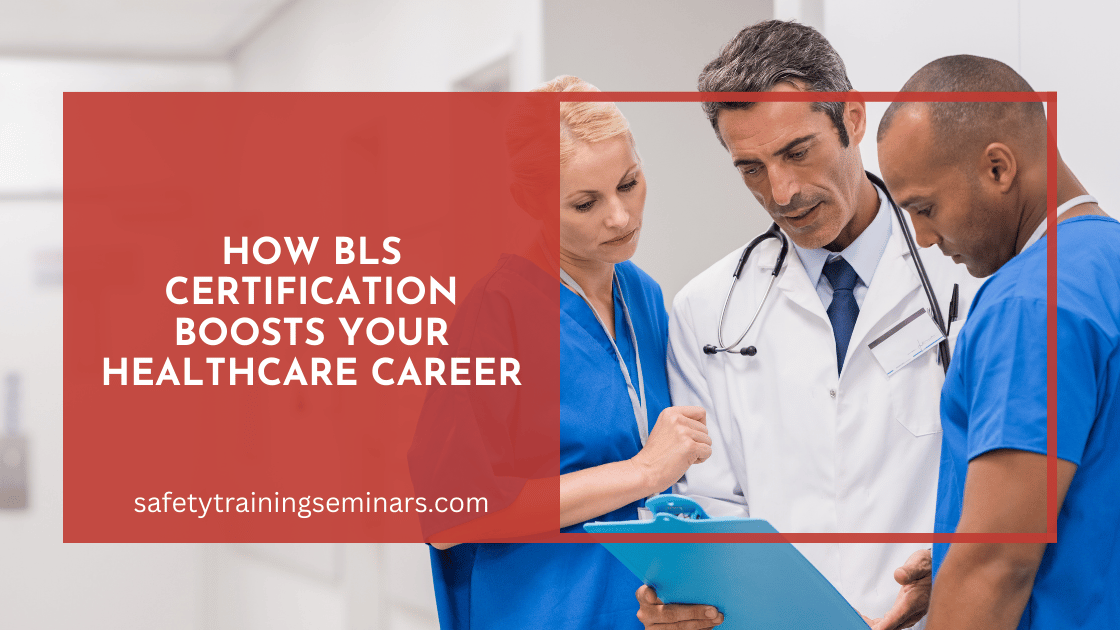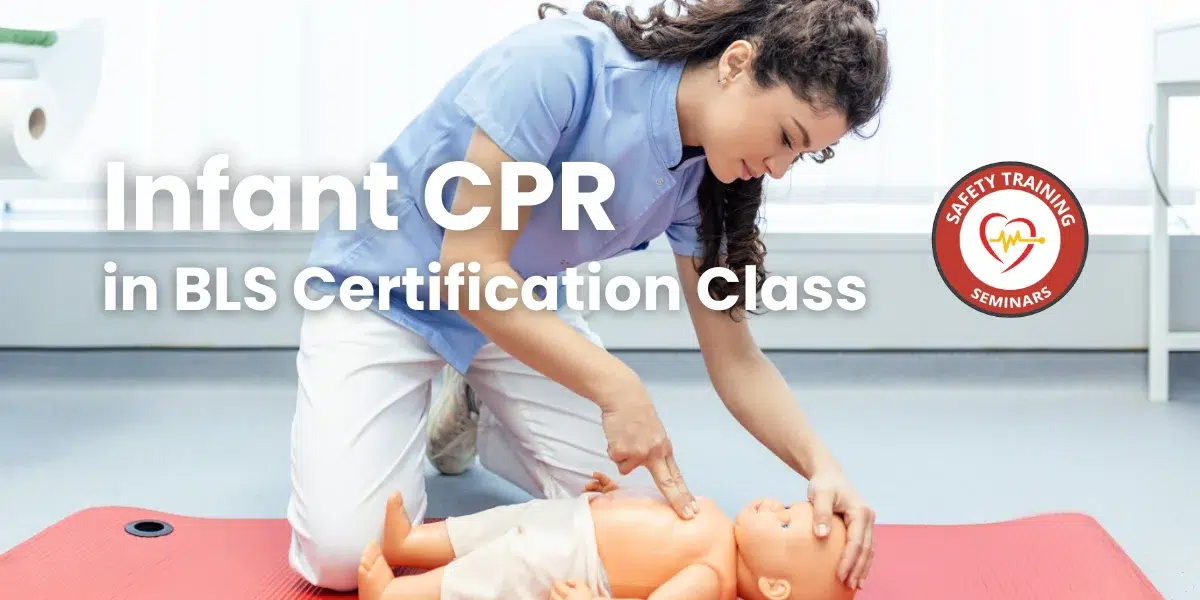BLS certification opens doors to better jobs, higher pay, and career advancement in healthcare. Most medical positions require Basic Life Support certification, and maintaining this credential shows employers you’re serious about patient safety and professional development.
The healthcare job market is competitive. Nurses, medical assistants, dental hygienists, and emergency medical technicians all need current BLS certification to work legally. But here’s what many don’t realize: the right BLS training can do more than meet basic requirements. It can accelerate your entire career trajectory.
At Safety Training Seminars, we’ve trained thousands of healthcare professionals since 1989. We’ve seen how quality BLS certification transforms careers. Our students consistently report better job prospects, faster promotions, and increased confidence in emergency situations.
Why Healthcare Employers Demand BLS Certification
Healthcare facilities face strict liability and accreditation standards. The Joint Commission and state health departments require staff to maintain current life support certifications. Hospitals, clinics, and dental offices simply cannot hire uncertified personnel for most positions.
But certification requirements go deeper than legal compliance. Medical emergencies happen daily in healthcare settings. Cardiac arrests occur in hospitals every 37 seconds according to the American Heart Association. When seconds count, properly trained staff can mean the difference between life and death.
Employers know this reality. They prefer candidates with current, high-quality BLS training because it reduces risk and improves patient outcomes. Fresh certification demonstrates your commitment to excellence and patient safety.
Career Opportunities That Require BLS Certification
BLS certification is mandatory for most healthcare roles. Here are key positions that require current certification:
Registered Nurses: All RN positions require BLS certification before hire. Many hospitals prefer candidates with additional ACLS or PALS training for specialized units.
Licensed Practical Nurses: LPNs must maintain BLS certification throughout their careers. Certification renewal is often tied to license renewal requirements.
Medical Assistants: Both clinical and administrative medical assistants need BLS certification in most states. This training helps them respond to office emergencies.
Dental Professionals: Dentists, dental hygienists, and dental assistants require BLS certification. Dental emergencies like allergic reactions or cardiac events can occur during routine procedures.
Emergency Medical Technicians: EMTs need BLS certification plus additional emergency medical training. This forms the foundation of their professional competency.
Physical Therapists: PTs work with patients who may have cardiac or respiratory conditions. BLS training prepares them for potential emergencies during treatment.
Pharmacy Technicians: Many pharmacy settings require BLS certification, especially hospital pharmacies where staff may encounter medical emergencies.
How BLS Certification Advances Your Career
Quality BLS training provides benefits beyond meeting minimum requirements. Here’s how it can boost your career:
Increased Job Opportunities
Current BLS certification makes you eligible for more positions. Hospital job postings typically state “BLS certification required” or “must obtain within 30 days of hire.” Having certification ready eliminates barriers to immediate employment.
We’ve seen students land dream jobs because they had current certification while other candidates didn’t. One nursing student told us she got hired at her top-choice hospital because she was the only applicant with BLS, ACLS, and PALS certifications ready on day one.
Higher Starting Salaries
Certified professionals often negotiate higher starting salaries. Employers value candidates who arrive job-ready without needing immediate training investment. Some facilities offer signing bonuses for nurses with multiple certifications.
Faster Career Progression
BLS certification is often prerequisite for advanced roles. Charge nurses, supervisors, and department heads typically need current life support training. Having certification positions you for promotion opportunities as they arise.
Professional Confidence
Proper BLS training builds confidence in emergency situations. This confidence shows in your work performance and interactions with patients and colleagues. Confident healthcare workers tend to advance faster than those who seem uncertain or unprepared.
Continuing Education Credits
Many BLS programs offer continuing education credits. These credits help maintain professional licenses and demonstrate ongoing commitment to learning. Some employers reimburse certification costs or provide paid time for training.
Choosing Quality BLS Training Makes a Difference
Not all BLS courses are equal. The training quality affects both your career prospects and your ability to respond effectively in emergencies. Here’s what to look for in BLS certification:
American Heart Association Certification
AHA certification is the gold standard in healthcare. Most employers specifically require AHA BLS certification because of its rigorous standards and regular updates based on latest resuscitation science.
At Safety Training Seminars, we’re an official AHA Training Center (20784) licensed to teach in every state. Our instructors follow AHA guidelines exactly, ensuring you receive the most current, evidence-based training.
Hands-On Skills Practice
Quality BLS training includes extensive hands-on practice with mannequins and equipment. You need muscle memory for chest compressions, rescue breathing, and AED operation. Online-only courses cannot provide this critical component.
Our blended learning approach combines convenient online coursework with thorough in-person skills testing. You complete the knowledge portion at your own pace, then demonstrate competency with our certified instructors.
Same-Day Certification
Healthcare hiring moves fast. Some training companies take weeks to issue certificates, potentially costing you job opportunities. We issue AHA cards the same day you complete skills testing, so you can start applying immediately.
Convenient Scheduling
Healthcare professionals work varied schedules. Quality training providers offer flexible class times including evenings and weekends. We offer BLS classes every day of the week at over 65 California locations.
Advanced Certifications That Boost Your Career
While BLS forms the foundation, additional certifications can significantly accelerate career growth:
ACLS (Advanced Cardiovascular Life Support)
ACLS training prepares you for complex cardiac emergencies. Critical care nurses, emergency department staff, and paramedics typically need ACLS certification. This advanced training can qualify you for specialized, higher-paying positions.
Our ACLS program includes 2-3 hours of online coursework followed by 30 minutes of skills testing. Many professions receive 2-3 continuing education units for completion.
PALS (Pediatric Advanced Life Support)
PALS certification is essential for pediatric healthcare roles. Pediatric nurses, emergency medical staff, and neonatal intensive care professionals need this specialized training.
PALS training covers pediatric assessment, respiratory emergencies, and cardiac arrest management in children and infants. Completion provides 3.75-5 CEU credits for many professions.
NRP (Neonatal Resuscitation Program)
NRP certification is crucial for labor and delivery nurses, neonatologists, and respiratory therapists. This specialized training covers newborn resuscitation techniques and emergency care.
Our NRP program includes comprehensive online training plus three hours of hands-on skills practice. Participants earn four continuing education units upon completion.
Making Your Certification Investment Pay Off
BLS certification is an investment in your career. Here’s how to maximize the return:
Keep Certification Current
BLS certification expires every two years. Mark renewal dates on your calendar and schedule recertification early. Expired certification can cost you job opportunities or result in work suspension.
Add Multiple Certifications
Healthcare professionals with multiple certifications are more valuable to employers. Consider adding ACLS, PALS, or specialty certifications relevant to your career goals.
Document Everything
Keep copies of all certification cards and continuing education certificates. Create a professional portfolio that demonstrates your ongoing commitment to training and development.
Leverage Employer Reimbursement
Many healthcare employers reimburse certification costs or provide paid time for training. Check with your HR department about available benefits before paying out of pocket.
Ready to Advance Your Healthcare Career?
BLS certification is your gateway to better healthcare career opportunities. Quality training from an accredited provider gives you the skills, confidence, and credentials employers demand.
We make certification convenient and affordable. Our blended learning approach combines online flexibility with thorough hands-on training. With over 70 locations throughout California and daily class schedules, you can get certified on your timeline.
Don’t let expired or missing certification hold back your career. Healthcare opportunities won’t wait for you to get certified. Take action now and position yourself for the healthcare career you deserve.
Visit our website to view upcoming BLS classes near you, or call us at 800-470-9026. Our customer service team is available seven days a week from 8 AM to 10 PM to help you get started. Your healthcare career advancement begins with that first step toward quality BLS certification.
American Heart Association courses are designed to provide the most up-to-date and effective training in emergency response. Whether you’re based in the Bay Area or the Sacramento region, enrolling in BLS CPR Classes in Hayward or BLS CPR Classes in Folsom ensures you receive high-quality, hands-on instruction that prepares you to respond confidently in real-life emergencies.




